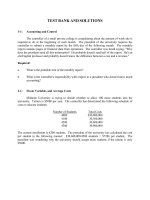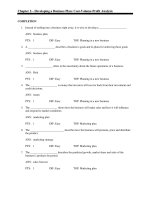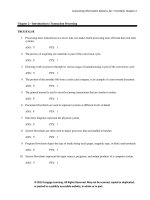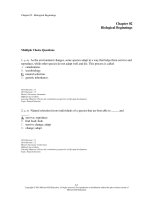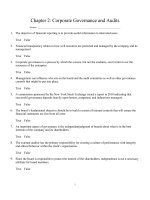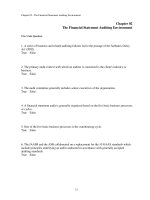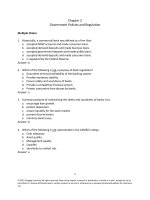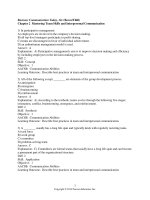Global business today 8th edition hill test bank
Bạn đang xem bản rút gọn của tài liệu. Xem và tải ngay bản đầy đủ của tài liệu tại đây (784.03 KB, 160 trang )
Chapter 02
National Differences in Political Economy
True / False Questions
1.
The term political economy is used to stress the fact that the political, economic, and legal systems
of a country are independent of each other.
True
2.
False
Political systems that emphasize collectivism tend to be democratic, while political systems that
place a high value on individualism tend to be totalitarian.
True
3.
Plato did not equate collectivism with equality.
True
4.
False
False
Karl Marx advocated state ownership of the basic means of production, distribution, and exchange
(i.e., businesses).
True
False
2-1
© 2014 by McGraw-Hill Education. This is proprietary material solely for authorized instructor use. Not authorized for sale or distribution
in any manner. This document may not be copied, scanned, duplicated, forwarded, distributed, or posted on a website, in whole or part.
5.
The social democratsbelieved that socialism could be achieved only through violent revolution and
totalitarian dictatorship.
True
6.
By the mid-1990s, communism was rising worldwide.
True
7.
False
False
One of the tenets of collectivism is that the welfare of society is best served by letting people
pursue their own economic self-interest.
True
8.
False
In practical terms, individualism translates into an advocacy for democratic political systems and
market economics.
True
9.
False
The Cold War was in many respects a war between collectivism, championed by the former Soviet
Union, and individualism, championed by the United States.
True
False
10. In practical terms, collectivism creates a more favorable environment for international businesses
to operate in than individualism.
True
False
2-2
© 2014 by McGraw-Hill Education. This is proprietary material solely for authorized instructor use. Not authorized for sale or distribution
in any manner. This document may not be copied, scanned, duplicated, forwarded, distributed, or posted on a website, in whole or part.
11. In a representative democracy, elected representatives who fail to perform their job adequately
cannot be voted out of office at the next election.
True
False
12. In a totalitarian country, all the constitutional guarantees on which representative democracies are
built—an individual’s right to freedom of expression and organization, a free media, and regular
elections—are denied to the citizens.
True
False
13. In most democratic states, those who question the right of the rulers to rule find themselves
imprisoned, or worse.
True
False
14. The governments of China, Vietnam, and Laos are communist in name only because those nations
have adopted wide-ranging market-based economic reforms.
True
False
15. All right-wing dictatorships display an affinity toward socialist or communist ideas.
True
False
16. In countries where individual goals are given primacy over collective goals, we are less likely to find
market-based economic systems.
True
False
2-3
© 2014 by McGraw-Hill Education. This is proprietary material solely for authorized instructor use. Not authorized for sale or distribution
in any manner. This document may not be copied, scanned, duplicated, forwarded, distributed, or posted on a website, in whole or part.
17. In a pure command economy, the goods and services that a country produces, the quantity in
which they are produced, and the prices at which they are sold are all dictated by the interaction
of demand and supply.
True
False
18. Command economies provide a more favorable environment for innovation and entrepreneurs
than market economies.
True
False
19. Historically, pure market economies were found in communist countries where collectivist goals
were given priority over individual goals.
True
False
20. A common law system tends to be less adversarial than a civil law system.
True
False
21. When law courts interpret civil law, they do so with regard to tradition, precedent, and custom.
True
False
22. Contracts drafted under a common law framework tend to be very detailed with all contingencies
spelled out.
True
False
23. Judges under a civil law system have less flexibility than those under a common law system.
True
False
2-4
© 2014 by McGraw-Hill Education. This is proprietary material solely for authorized instructor use. Not authorized for sale or distribution
in any manner. This document may not be copied, scanned, duplicated, forwarded, distributed, or posted on a website, in whole or part.
24. Islamic law is primarily a moral rather than a commercial law and is intended to govern all aspects
of life.
True
False
25. Compared to common law system, it is more expensive to draw up contracts in a civil law
jurisdiction.
True
False
26. By adopting the Contracts for the International Sale of Goods (CIGS), a nation signals to other
adopters that it will treat the convention’s rules as part of its law.
True
False
27. When firms do not wish to accept the Contracts for the International Sale of Goods, they often opt
for arbitration by a recognized arbitration court to settle contract disputes.
True
False
28. Private action to violate property rights occurs when public officials, such as politicians and
government bureaucrats, extort income, resources, or the property itself from property holders.
True
False
29. Bribes are legal payments meant to facilitate performance of duties that the recipients are already
obligated to perform.
True
False
2-5
© 2014 by McGraw-Hill Education. This is proprietary material solely for authorized instructor use. Not authorized for sale or distribution
in any manner. This document may not be copied, scanned, duplicated, forwarded, distributed, or posted on a website, in whole or part.
30. Intellectual property laws stimulate innovation and creative work.
True
False
31. The term "public action" refers to the exclusive legal rights of authors, composers, playwrights,
artists, and publishers to publish and disperse their work as they see fit.
True
False
32. International businesses lobby their respective governments to push for international agreements
to ensure that intellectual property rights are protected and that the law is enforced.
True
False
33. When intellectual property laws are lax, firms are at a greater risk of having their ideas stolen by
local entrepreneurs.
True
False
34. Liability laws are typically least extensive in highly developed nations.
True
False
35. When product safety laws are tougher in a firm’s home country than in a foreign country, the
ethical thing to do is to adhere to home-country standards.
True
False
36. The benefits, costs, and risks associated with doing business in a country are independent of that
country’s political, economic, and legal systems.
True
False
2-6
© 2014 by McGraw-Hill Education. This is proprietary material solely for authorized instructor use. Not authorized for sale or distribution
in any manner. This document may not be copied, scanned, duplicated, forwarded, distributed, or posted on a website, in whole or part.
37. Other things being equal, a nation with democratic political institutions, is clearly more attractive as
a place in which to do business than a nation that lacks democratic institutions.
True
False
Multiple Choice Questions
38. Which of the following systems is a part of the political economy?
A. Religious system
B. Value system
C. Demographic system
D. Legal system
E. Technological system
39. Which of the following terms best represents the system of government in a nation?
A. Common system
B. Political system
C. Environmental system
D. Command system
E. Social system
2-7
© 2014 by McGraw-Hill Education. This is proprietary material solely for authorized instructor use. Not authorized for sale or distribution
in any manner. This document may not be copied, scanned, duplicated, forwarded, distributed, or posted on a website, in whole or part.
40. Which of the following statements is true about political systems?
A. The political system of a country is independent of its economic and legal systems.
B. The political system of a country is of no importance to international business.
C. It is not possible to have democratic societies that emphasize a mix of collectivism and
individualism.
D. it is possible to have totalitarian societies that are not collectivist.
E. The societal culture of a country does not influence its political system.
41. When _____ is emphasized, the needs of society as a whole are generally viewed as being more
important than individual freedoms.
A. democracy
B. collectivism
C. individualism
D. capitalism
E. privatization
42. In the country of Normian Republic, an individual’s right to own land is restricted to a large extent
on the basis that it runs counter to “the common good.” In this context, which of the following is
most likely to be the political system adopted by Normian Republic?
A. Individualism
B. Democracy
C. Collectivism
D. Capitalism
E. Protectionism
2-8
© 2014 by McGraw-Hill Education. This is proprietary material solely for authorized instructor use. Not authorized for sale or distribution
in any manner. This document may not be copied, scanned, duplicated, forwarded, distributed, or posted on a website, in whole or part.
43. A(n) _____ is a person who believes in public ownership of the means of production for the
common good of nation.
A. socialist
B. capitalist
C. individualist
D. monarchist
E. feudalist
44. Modern socialism traces its intellectual roots to:
A. Aristotle.
B. David Hume.
C. Karl Marx.
D. Adam Smith.
E. Milton Friedman.
45. Which of the following has been advocated by Karl Marx?
A. Capitalist Society
B. Individualism
C. Selling state-owned enterprises to private investors
D. Socialism
E. Private profit over public good
2-9
© 2014 by McGraw-Hill Education. This is proprietary material solely for authorized instructor use. Not authorized for sale or distribution
in any manner. This document may not be copied, scanned, duplicated, forwarded, distributed, or posted on a website, in whole or part.
46. In the early twentieth century, the socialist ideology split into two broad camps and the people
who believed that socialism could be achieved only through violent revolution and totalitarian
dictatorship were referred to as:
A. communists.
B. capitalists.
C. democrats.
D. individualists.
E. anarchists.
47. _____ attempt to achieve the same ideologies as that of the communists without violent revolution
and totalitarian dictatorship.
A. Pure capitalists
B. Social democrats
C. Individualists
D. Anarchists
E. Aristocrats
48. Which of the following is inconsistent with the Marxist philosophy?
A. Concern over public good rather than private profit
B. Monopoly of state-owned companies in certain industries
C. Opposing the ideologies of capitalist societies
D. Substantial limits on individual political freedom
E. Selling state-owned enterprises to private investors
2-10
© 2014 by McGraw-Hill Education. This is proprietary material solely for authorized instructor use. Not authorized for sale or distribution
in any manner. This document may not be copied, scanned, duplicated, forwarded, distributed, or posted on a website, in whole or part.
49. Which of the following is true about communism?
A. Communism propagates the idea of “private profit rather than public good."
B. By the mid-1990s communism started rising worldwide.
C. China has moved sharply away from strict adherence to communist ideology in the economic
sphere.
D. Communists committed themselves to achieving socialism by turning their backs on violent
revolution and dictatorship.
E. Communism stresses that the interests of the individual should take precedence over the
interests of the state.
50. The sale of state-owned enterprises to independent, nonpublic investors is referred to as:
A. privatization.
B. nationalization.
C. collectivism.
D. communalism.
E. public action.
51. Which of the following can be traced to the ancient Greek philosopher, Aristotle?
A. Collectivism
B. Individualism
C. Socialism
D. Totalitarianism
E. Communism
2-11
© 2014 by McGraw-Hill Education. This is proprietary material solely for authorized instructor use. Not authorized for sale or distribution
in any manner. This document may not be copied, scanned, duplicated, forwarded, distributed, or posted on a website, in whole or part.
52.
The Cedian government believes that its citizens should have complete freedom in their economic
and political pursuits, and the Cedian ideology is "private profit over public good." In this context,
it can be said that Cedia most likely follows the philosophy of:
A. totalitarianism.
B. socialism.
C. individualism.
D. communism.
E. Marxism.
53. _____ argued that private property is more highly productive than communal property and will thus
stimulate progress.
A. Aristotle
B. Friedrich Engels
C. Plato
D. Karl Marx
E. Charles Darwin
2-12
© 2014 by McGraw-Hill Education. This is proprietary material solely for authorized instructor use. Not authorized for sale or distribution
in any manner. This document may not be copied, scanned, duplicated, forwarded, distributed, or posted on a website, in whole or part.
54. In the context of individualism, which of the following is inconsistent with the works of the
ancient Greek philosopher Aristotle?
A. Guaranteeing individual freedom
B. Government dictating what is in best interest of society
C. Guaranteeing self-expression
D. Committing to private ownership
E. Treating individual diversity as desirable
55. Which of the following is most likely to be advocated by individualism?
A. Communal property is more highly productive than private property.
B. Public good should be preferred over private profit.
C. State-owned companies should monopolize certain industries.
D. The welfare of society is best served by some collective body such as government.
E. Free market ideologies should be followed for achieving better standards of living.
56. In practical terms, _____ translates into an advocacy for democratic political systems and free
market economics, which in general creates the most favorable environment for international
businesses to operate in.
A. collectivism
B. totalitarianism
C. individualism
D. communism
E. socialism
2-13
© 2014 by McGraw-Hill Education. This is proprietary material solely for authorized instructor use. Not authorized for sale or distribution
in any manner. This document may not be copied, scanned, duplicated, forwarded, distributed, or posted on a website, in whole or part.
57. Which of the following terms refers to a political system in which government is by the people,
exercised either directly or through elected representatives?
A. Despotism
B. Democracy
C. Totalitarianism
D. Theocracy
E. Communism
58. Democracy, in its purest form, is based on the belief that:
A. citizens should be directly involved in decision making.
B. political freedom of the citizens should be limited.
C. citizens are responsible for their own economic health and thus need no government.
D. individual freedom in the economic sphere should be restricted.
E. one person should have an absolute control over all the citizens of a nation.
59. In a _____, individuals periodically elected by citizens form a government to make decisions on
behalf of the electorate.
A. pure democracy
B. communist totalitarianism
C. right-wing totalitarianism
D. representative democracy
E. theocratic totalitarianism
2-14
© 2014 by McGraw-Hill Education. This is proprietary material solely for authorized instructor use. Not authorized for sale or distribution
in any manner. This document may not be copied, scanned, duplicated, forwarded, distributed, or posted on a website, in whole or part.
60. _____ is a form of government in which one person or political party exercises absolute control
over all spheres of human life and prohibits opposing political parties.
A. Capitalism
B. Totalitarianism
C. Pure democracy
D. Republicanism
E. Representative democracy
61. A(n) _____ is built upon the ideals of an individual's right to freedom of expression and
organization, a free media, and regular elections.
A. autocracy
B. representative democracy
C. theocracy
D. aristocracy
E. monocracy
62. Which of the following is a feature of representative democracy?
A. Restrictions on an individual’s right to freedom of expression, opinion, and organization
B. Inability of the citizens to vote out elected representatives who fail to perform their job
adequately at the next election
C. An unlimited term for elected representatives
D. A court system that is linked to the political system
E. A nonpolitical police force and armed service
2-15
© 2014 by McGraw-Hill Education. This is proprietary material solely for authorized instructor use. Not authorized for sale or distribution
in any manner. This document may not be copied, scanned, duplicated, forwarded, distributed, or posted on a website, in whole or part.
63. In most totalitarian states:
A. free and fair elections are not denied to the citizens.
B. there is free access to state information.
C. all the basic civil liberties are granted to the citizens.
D. the right to freedom of expression and organization is not curbed.
E. media are heavily censored.
64. _____ is a form of totalitarianism which advocates that socialism can be achieved only through a
totalitarian dictatorship.
A. Tribal totalitarianism
B. Democratic totalitarianism
C. Communist totalitarianism
D. Theocratic totalitarianism
E. Right-wing totalitarianism
65. States that limit the freedom of religious expression with laws based on religious principles, most
likely follow the political system of:
A. theocratic totalitarianism.
B. communist totalitarianism.
C. right-wing totalitarianism.
D. pure democracy.
E. representative democracy.
2-16
© 2014 by McGraw-Hill Education. This is proprietary material solely for authorized instructor use. Not authorized for sale or distribution
in any manner. This document may not be copied, scanned, duplicated, forwarded, distributed, or posted on a website, in whole or part.
66. A totalitarian political system in which a party, group, or individual that represents the interests of a
particular ethnic group monopolizes political power is referred to as:
A. theocratic totalitarianism.
B. communist totalitarianism.
C. right-wing totalitarianism.
D. tribal totalitarianism.
E. democratic totalitarianism.
67. _____ generally permits individual economic freedom, but restricts individual political freedom on
the grounds that it would lead to the rise of communism.
A. Pure democracy
B. Right-wing totalitarianism
C. Free market capitalism
D. Representative democracy
E. Communist totalitarianism
68. The fascist regimes that ruled Germany and Italy in the 1930s and 1940s had adopted:
A. right-wing totalitarianism.
B. theocratic totalitarianism.
C. representative democracy.
D. pure democracy.
E. totalitarian democracy.
2-17
© 2014 by McGraw-Hill Education. This is proprietary material solely for authorized instructor use. Not authorized for sale or distribution
in any manner. This document may not be copied, scanned, duplicated, forwarded, distributed, or posted on a website, in whole or part.
69. A common feature of many right-wing dictatorships is:
A. total restriction on individual economic freedom.
B. strong commitment to socialist or communist ideas.
C. governments that are made up of military officers.
D. politicians from a particular tribe dominating the political system.
E. the direct involvement of the citizens in decision making.
70. In which countries are we likely to find free market economies?
A. Countries where the good of the society has precedence over private profit
B. Countries where individual goals are given primacy over collective goals
C. Countries where state-owned enterprises have monopoly in certain industries
D. Countries that have adopted communism as their political system
E. Countries where the government plans the goods and services produced
71. A _____ economy is an economic system in which the interaction of supply and demand
determines the quantity in which goods and services are produced.
A. barter
B. command
C. market
D. regulated
E. centrally planned
2-18
© 2014 by McGraw-Hill Education. This is proprietary material solely for authorized instructor use. Not authorized for sale or distribution
in any manner. This document may not be copied, scanned, duplicated, forwarded, distributed, or posted on a website, in whole or part.
72. Which of the following statements is most likely to be true regarding private ownership?
A.
It reduces a nation's dynamism and its investments in innovation and creativity.
B. It is most commonly found in command economies.
C. It eliminates competitors and reduces pressure to lower production costs.
D. It gives entrepreneurs an incentive to search for better ways of serving consumer needs.
E. It is based on the philosophy that "the good of society is more important than the interests of an
individual."
73. In a pure _____ economy, the government plans the goods and services that a country produces,
the quantity in which they are produced, and the prices at which they are sold.
A. command
B. market
C. mixed
D. laissez-faire
E. deregulated
74. In a _____ economy, all businesses are state owned, the rationale being that the government can
then direct them to make investments that are in the best interests of the nation as a whole rather
than in the interests of private individuals.
A. free market
B. deregulated
C. pure command
D. mixed
E. laissez-faire
2-19
© 2014 by McGraw-Hill Education. This is proprietary material solely for authorized instructor use. Not authorized for sale or distribution
in any manner. This document may not be copied, scanned, duplicated, forwarded, distributed, or posted on a website, in whole or part.
75. In comparison to market economies, command economies lack:
A. government interference in allocation of resources.
B. dynamism and innovation.
C. concern for the interests of the nation.
D. commitment to communism.
E. any opposition to private ownership.
76. In comparison to pure command economies, free market economies lack:
A. private ownership.
B. incentives for entrepreneurs.
C. incentives to improve products and processes.
D. government control over production and pricing.
E. vigorous free competition between producers.
77. In a _____ economy, certain sectors of the economy are left to private ownership and free market
mechanisms, while in other sectors there is significant state ownership and government planning.
A. command
B. pure market
C. mixed
D. centrally planned
E. laissez-faire
2-20
© 2014 by McGraw-Hill Education. This is proprietary material solely for authorized instructor use. Not authorized for sale or distribution
in any manner. This document may not be copied, scanned, duplicated, forwarded, distributed, or posted on a website, in whole or part.
78. In mixed economies, governments sometimes tend to take into state ownership troubled firms
whose continued operation is thought to be vital to national interests. Once a government takes
into state ownership such troubled firms, they are said to be _____.
A. privatized
B. decentralized
C. liberalized
D. nationalized
E. deregulated
79. Which of the following is true about the three broad types of economic systems?
A. For pure market economy to function efficiently product supply must be restricted.
B. In a command economy, state-owned enterprises have little incentive to control costs and be
efficient.
C. The sole role of government in a command economy is to encourage vigorous free and fair
competition between private producers.
D. Mixed economies were once uncommon throughout much of the world, although they are
becoming much popular now.
E. Production in command economies is determined by the interaction of supply and demand and
signaled to producers through the price system.
2-21
© 2014 by McGraw-Hill Education. This is proprietary material solely for authorized instructor use. Not authorized for sale or distribution
in any manner. This document may not be copied, scanned, duplicated, forwarded, distributed, or posted on a website, in whole or part.
80. The Boldovian government took Sea Lion Inc., a domestic, private shipbuilding firm, into state
ownership to save the company from bankruptcy. However, the other private competitors in the
shipbuilding industry were raged at this decision of the government. As a result, the government
had to reduce the tax burden on all other private shipbuilding firms so that both the state-owned
enterprise and private firms could co-exist. According to this information, Boldovia has most likely
adopted a _____ economy.
A. mixed
B. market-based
C. command
D. laissez-faire
E. communist
81. Collectivist-inclined totalitarian states tend to enact laws that severely restrict private enterprises,
whereas the laws enacted by governments in democratic states, where individualism is the
dominant political philosophy, tend to be pro-private enterprise and pro-consumer. This indicates
that the:
A. economic system of a country is independent of its legal system.
B. legal system of a country is not influenced by the prevailing political system.
C. legal system does not affect the attractiveness of a country as an investment site or market.
D. all the countries have the same legal environments.
E. the legal framework of a country reflects the rulers’ dominant political ideology.
2-22
© 2014 by McGraw-Hill Education. This is proprietary material solely for authorized instructor use. Not authorized for sale or distribution
in any manner. This document may not be copied, scanned, duplicated, forwarded, distributed, or posted on a website, in whole or part.
82. Which of the following is true about legal systems?
A. All countries have the same, uniform legal environment.
B. Unlike the economic system of a country, the legal system is independent of the country's
political system.
C. The government of a country defines the legal framework within which firms do business.
D. The attractiveness of a country as an investment site or market is unaffected by its legal system.
E. Collectivist-inclined totalitarian states tend to enact laws that are pro-private enterprise.
83. Which of the following legal systems is most likely to be based on tradition, precedent, and
custom?
A. Common law
B. Civil law
C. Autocracy law
D. Monarchy law
E. Universal law
84. In the context of common law, which of the following terms refers to the ways in which laws are
applied in specific situations?
A. Tradition
B. Precedent
C. Custom
D. Interpretation
E. Culture
2-23
© 2014 by McGraw-Hill Education. This is proprietary material solely for authorized instructor use. Not authorized for sale or distribution
in any manner. This document may not be copied, scanned, duplicated, forwarded, distributed, or posted on a website, in whole or part.
85. In the context of common law, the term "tradition" most likely refers to the:
A. religious aspect in the law.
B. ways in which laws are applied in specific situations.
C. political beliefs of the majority of the people in the country
D. legal history of a country.
E. ways in which laws are organized into codes.
86.
The common law system enjoys a degree of flexibility not found in other
systems because :
A. it
is usually found in democratic republics.
B. it
originated from Great Britain and can be found in almost all of its
former colonies.
C. it
is interpreted by the law courts with regard to tradition, precedent, and
custom.
D. it
is based on a detailed set of laws organized into codes.
E. it
has originated recently; almost a decade ago.
2-24
© 2014 by McGraw-Hill Education. This is proprietary material solely for authorized instructor use. Not authorized for sale or distribution
in any manner. This document may not be copied, scanned, duplicated, forwarded, distributed, or posted on a website, in whole or part.
87.
A _____ law system is based on a detailed set of laws organized into codes.
A. civil
B. theocratic
C. common
D. traditional
E. precedent
88. A legal system which is based primarily on religious teachings is referred to as the:
A. civil law system.
B. theocratic law system.
C. common law system.
D. precedent law system.
E. public law system.
89. _____ is the most widely practiced theocratic legal system in the modern world.
A. Christian law
B. Islamic law
C. Jewish law
D. Hindu law
E. Buddhist law
2-25
© 2014 by McGraw-Hill Education. This is proprietary material solely for authorized instructor use. Not authorized for sale or distribution
in any manner. This document may not be copied, scanned, duplicated, forwarded, distributed, or posted on a website, in whole or part.
